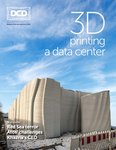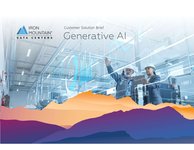I don't need to tell you that we're in an artificial intelligence boom.
For a journalist, my emotions are mixed. On the one hand, as the editor of a publication focused on digital infrastructure, the current sector explosion has been nothing but good for us.
We have more to write about than ever before. The end of industry norms means that data center operators need an independent voice like never before. And, while the editorial team is separate from DCD's wider commercial operations, ballooning market activity has undoubtedly helped us expand our team to ten journalists.
It is, therefore, unsurprising that I have a vested interest in wanting the good times to keep going. Like any sensible business, we are trying to figure out how to take advantage of the current growth opportunity, while being careful not to overexpand if this ends up being a bubble that pops hard.
At the same time, however, another part of me hopes that AI's growth does temper somewhat. As someone that makes a living primarily from writing, and that employs a team of wonderful humans that do the same, it is undeniably unsettling to see the rapid progress of large language models.
I remain convinced that current generative AI approaches have no hope of matching what my team does. Even if hallucinations and accuracy are solved (a big if), the simple act of stringing words together is not what makes us journalists.
We work with sources (if you have a tip, get in touch), FOIAs, boots on the ground reporting, and more to add to the Internet's collective knowledge - rather than just rearranging existing datasets.
But the reality is that AI doesn't need to be as good as us to undermine us. The death of link-based search engines would be a death knell for many a publication, while an explosion of AI-generated publications could drown out the human-crafted content, pushing us to the brink.
I find myself wishing for a likely fantasy: A level of AI that keeps growing and financing the next wave of the Internet, but that never quite achieves the intellectual capabilities to displace myself and those around me.
This is a somewhat selfish view, and one that we try to keep out of our reporting - where we aim for the classic neutral news approach that is mostly impossible. But I suspect that I will soon not be alone in this view.
I recently visited the labs of a major hyperscaler where a researcher gave me a peek at prototype robots designed for lights out data centers. Others are doing the same.
As more jobs in the sector face this moment, where the boom they were a part of fueling starts to render them irrelevant, it may cause many of us to look back at this time as the good ol' days.





